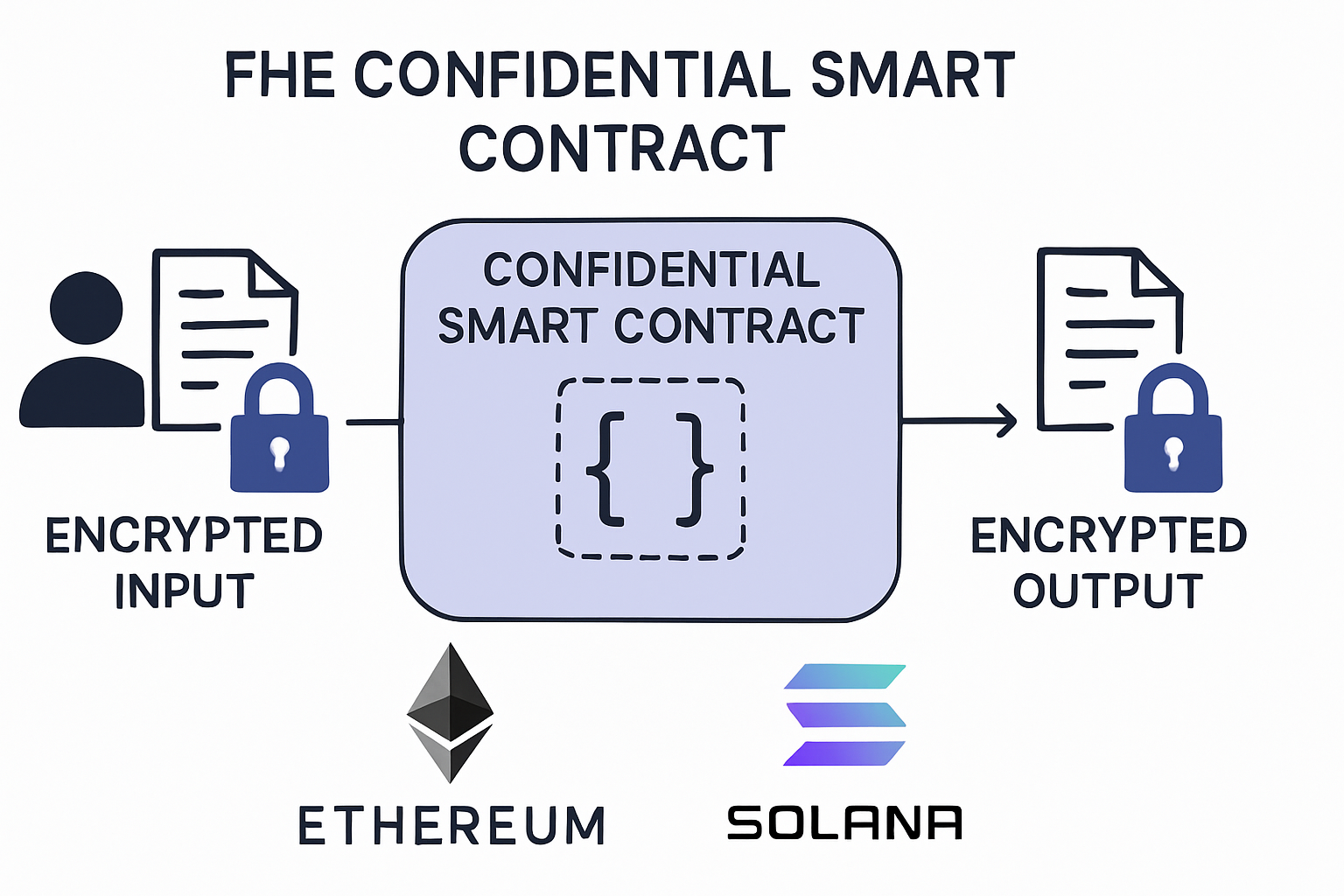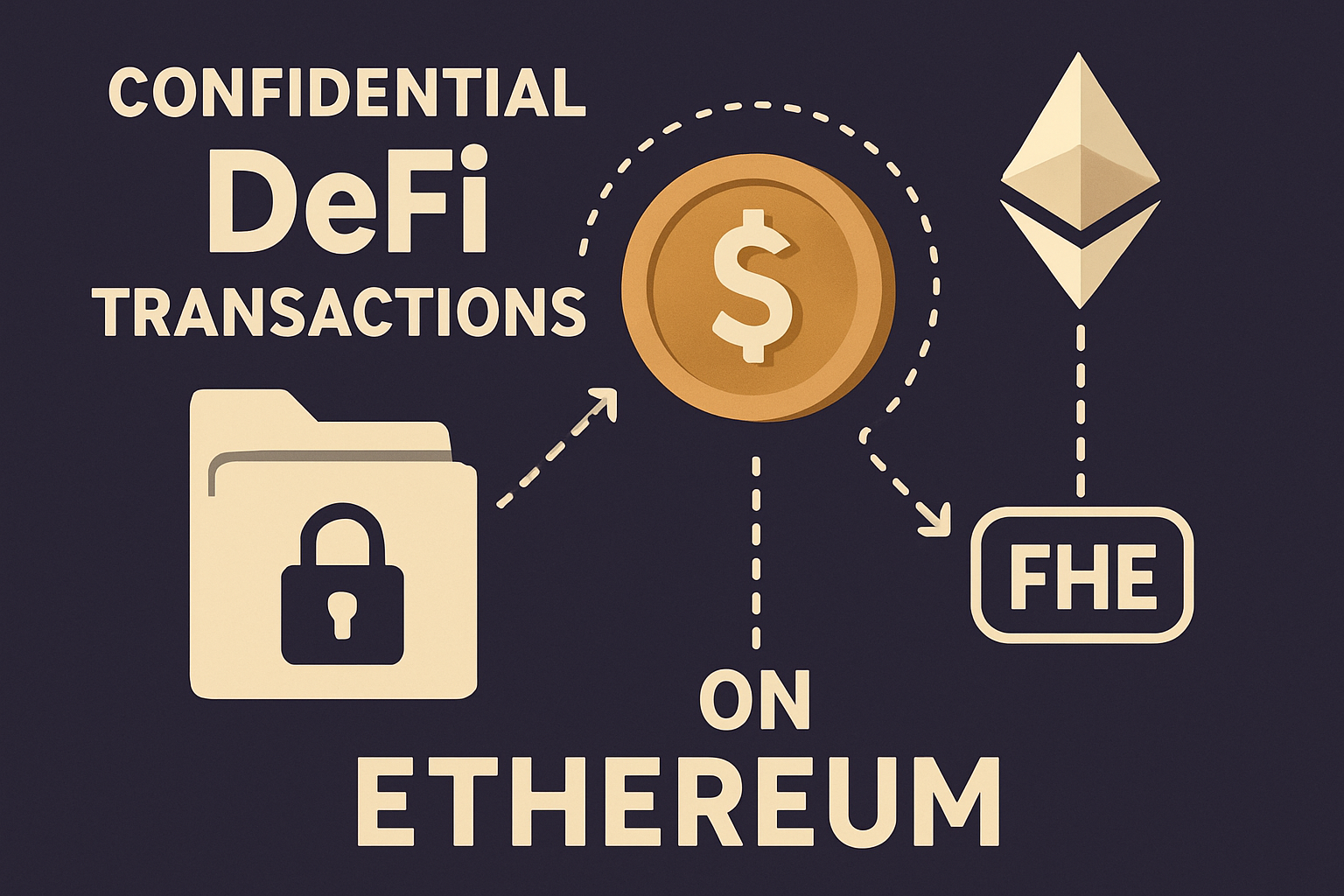
Fully Homomorphic Encryption (FHE) is rapidly shifting the privacy paradigm across blockchain ecosystems, offering a breakthrough: the ability to perform computations directly on encrypted data. For years, Ethereum and Solana have been celebrated for their programmability and decentralization, but their transparent ledgers posed a challenge for applications demanding confidentiality. Today, with Ethereum trading at $3,933.03, the race to enable privacy-preserving smart contracts is more relevant than ever for DeFi, governance, and enterprise use cases.

What Makes FHE a Game-Changer for Blockchain Privacy?
Traditional blockchains make all contract data public by default. While this transparency fuels trustless execution, it also exposes sensitive information, think financial transactions, identity details, or business logic, to anyone scanning the chain. Previous solutions like zero-knowledge proofs (ZKPs) provided selective disclosure but still required some data to be revealed or proved externally.
FHE flips this script completely. With FHE-powered smart contracts, users can encrypt their inputs before sending them to the blockchain. The contract then processes these encrypted inputs without ever decrypting them. The result? Only authorized parties can access the output in plaintext, everyone else sees only ciphertext throughout computation and storage.
This innovation unlocks new possibilities for confidential dApps on both Ethereum and Solana:
- Private DeFi: Execute trades or manage portfolios without exposing strategies or balances.
- Confidential Voting: On-chain governance where ballots are secret yet verifiable.
- Secure Identity Management: Authenticate users or credentials without revealing personal data on-chain.
Zama’s fhEVM: Lowering Barriers for Developers
Zama has emerged as a pioneer in bringing FHE to smart contract platforms. Their Fully Homomorphic Encryption Virtual Machine (fhEVM) enables Solidity developers to build encrypted smart contracts on EVM-compatible chains, including Ethereum, without needing deep cryptography expertise. This means developers can focus on application logic while Zama’s tooling ensures end-to-end encryption of transaction inputs and contract state.
The June 2025 launch of Zama Confidential Blockchain Protocol further extends this capability across multiple blockchains like Ethereum and Solana. By leveraging FHE at the protocol level, Zama enables cross-chain confidential dApps that preserve composability, a key requirement for modern DeFi protocols, while keeping every step of computation private. For more technical insights into how FHE integrates with EVM chains, see our resource: How Fully Homomorphic Encryption (FHE) Enables Confidential Smart Contracts on EVM Chains.
Pushing Boundaries: Fhenix and Confidential Rollups
The innovation doesn’t stop at protocol layers. Projects like Fhenix are building the first FHE-powered rollup solutions for Ethereum. Unlike traditional rollups that batch transactions but leave them transparent, an FHE rollup processes all user inputs in encrypted form, ideal for applications like private gaming or sealed-bid auctions where secrecy is non-negotiable.
This approach differs from ZKPs by allowing arbitrary computations over encrypted data rather than just proving knowledge of a secret or verifying simple predicates. As these technologies mature together with rising ETH prices (currently at $3,933.03), we’re witnessing a new wave of privacy-first applications poised to transform what’s possible in decentralized finance and beyond.
Yet, FHE’s promise comes with its own set of technical and practical challenges. Historically, fully homomorphic encryption was notorious for its computational overhead, making it impractical for real-time or high-throughput blockchain environments. However, recent breakthroughs in cryptographic engineering and hardware acceleration are rapidly narrowing this gap. Zama’s fhEVM and Fhenix’s rollup architectures both demonstrate that confidential smart contracts can be performant enough to meet the demands of DeFi and enterprise use cases without sacrificing user experience.
Challenges: Performance, Usability, and Ecosystem Adoption
Despite the momentum, several hurdles remain before FHE-powered smart contracts become mainstream on Ethereum and Solana. The most significant is performance: even with optimizations, FHE computations are still slower than their plaintext counterparts. This means developers must carefully balance privacy needs against transaction costs and latency.
Usability is another key factor. Integrating encrypted workflows into existing dApps requires new wallet standards, developer tooling, and secure key management practices. Fortunately, open-source initiatives like zama-ai/fhevm are making it easier for teams to experiment without deep cryptography backgrounds.
Ecosystem adoption will depend on demonstrating real-world value, confidential lending protocols that prevent frontrunning, private DAOs where votes remain secret until tallying, or healthcare applications where patient data stays encrypted end-to-end. As these use cases mature, expect major dApp platforms to add native support for FHE-based primitives.
The Road Ahead: Confidential dApps at Scale
The integration of FHE into leading blockchains is a pivotal step toward truly confidential decentralized applications. With Ethereum holding steady at $3,933.03, privacy-preserving smart contracts are no longer a theoretical ideal, they’re an emerging reality poised to redefine trust in Web3.
If you’re a developer or enterprise considering confidential dApps powered by encrypted smart contracts on Ethereum or Solana, now is the time to explore this technology stack. The landscape is evolving quickly: protocol upgrades, developer SDKs, and cross-chain bridges are all accelerating adoption of privacy-first applications.
Top Use Cases for FHE Smart Contracts on Public Blockchains
-

Confidential DeFi Transactions: FHE enables private trading, lending, and asset management on platforms like Ethereum and Solana, ensuring that transaction amounts, counterparties, and strategies remain encrypted and confidential throughout processing.
-

Private On-Chain Voting & Governance: Solutions like Fhenix use FHE to allow truly private voting in DAOs and governance systems, where individual votes are encrypted and counted without revealing voter choices, boosting transparency and privacy.
-

Secure Identity & Credential Management: FHE-powered smart contracts enable users to prove credentials or attributes (such as age, KYC status, or reputation) without exposing sensitive personal data, supporting privacy-preserving identity solutions on-chain.
-

Confidential Gaming & Gambling: Platforms leveraging FHE can process encrypted game states and bets, ensuring that player strategies, moves, and outcomes remain private, as pioneered by projects like Zama fhEVM.
-

Private Auctions & Bidding: FHE smart contracts allow for sealed-bid auctions where all bids remain encrypted until the auction ends, preventing front-running and ensuring fair, confidential price discovery on public blockchains.
For a deeper dive into how FHE compares with other privacy technologies like zero-knowledge proofs, and how you can start building today, visit our comprehensive guide: How Fully Homomorphic Encryption (FHE) Enables Confidential Smart Contracts on Public Blockchains.
The next generation of decentralized finance and governance will rely on robust privacy guarantees as much as transparency. With projects like Zama and Fhenix setting the pace, and continuous improvements in both cryptography and developer experience, the vision of confidential computation on public blockchains is finally within reach.






